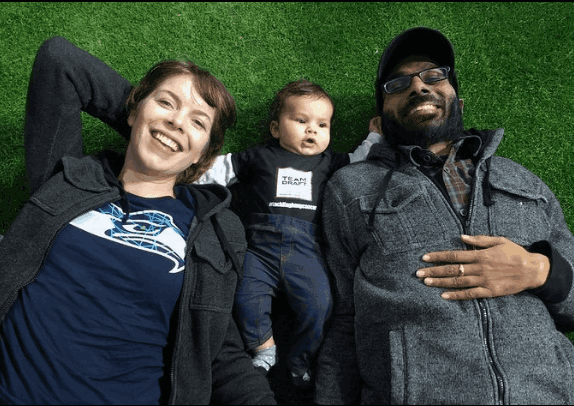When Breath Becomes Air, Paul Kalanithi’s memoir is renowned. After realizing he had stage 4 lung cancer and the prognosis, the Stanford neurosurgeon began blogging about his descent into death. The novel is funny, graceful, and brutally honest.
Posthumously published in 2016 by Stanford internist Lucy Kalanithi, his physician wife, the narrative is monumental and inspiring. According to one critic, “It’s a story so remarkable, so stunning and so affecting that I had to take dozens of breaks just to compose myself enough to get through it.”
It Was a New York Times Bestseller for 68 weeks and Translated into 39 Languages
Five years have passed since Paul Kalanithi died. Lucy Kalanithi and 5-year-old Cady moved. Kalanithi loved again. The Santa Cruz Mountains’ field-edge tomb of Paul is still visited.
This breathtaking site overlooks the Pacific Ocean a few miles distant. In the When Breath Becomes Air epilogue, Kalanithi wrote that she massages the grass “as if it were Paul’s hair.” They picnic and bring flowers.
“Paul’s decision to look death in the eye was a testament to not just who he was in his final hours of life but who he had always been,” she wrote in the epilogue. For most of his life, Paul questioned if he could face death with honesty. It turned out yes. I was his wife and witness.”
Kalanithi spoke with contributing editor Paul Costello at the San Mateo Public Library about their family’s legacy. Their conversation included her life after her husband’s diagnosis and how to move on after death. That conversation inspired this Q&A.
Costello
How is reading Paul’s book on public occasions a few years after his death?
Kalanithi
Reading it is enjoyable for many reasons. I enjoy hearing Paul’s words. Since I’m part of our collaboration, I feel connected to him. So proud of him.
Costello
After Princess Diana’s death, Prince Harry called sadness “a wound that festers.” That sounds right.
Kalanithi
Said that? Very touching and sad. I don’t see it as a metaphor because as a doctor, I say, “Well, if a wound festers, it’s untended.” I agree with the bit that implies it won’t just close and leave a nice scar. A wound. Time has affected my sorrowful experience.
Kalanithi
I was surprised by melancholy, loneliness, and anxiety in that first year. I got many questions about Paul, so a book tour was great. People would approach me and say, “I read your husband’s book.” This is my opinion.” This true opening to feeling less alone. That anguish has subsided, but I still love Paul. The love feels salient to me.
Costello
Paul’s terrible illness must have prompted two reactions. A wife and a doctor.
Kalanithi
Entered a hospital computer. CT scans showed it clearly. Suddenly, all symptoms made sense. It seemed like being between the past and the future. It was obvious we had an incurable condition. Very disorienting. Faceting your mortality was another obstacle. Paul stated, “The future I imagined evaporated.” We probably talked in bullet points. Paul said, “I don’t want to die.” We used to whisper at night.
Costello
What made you have a child after all that intensity?
Kalanithi
That felt unreasonable. Paul was more determined than I to have a kid. I answered, “It will be difficult. Your illness is serious. I worry that facing death and saying goodbye to a new baby will be difficult. What do you think?” “Wouldn’t it be great if it made it hard?” It beautifully summed up our lives. Joy can’t always come without sadness.
Costello
How did you balance an infant and a dying husband with their many needs?
Kalanithi
I found this fury of love when Paul was unwell and as a mother. Love made me feel invincible—“Whatever happens, it’ll be OK.” I used to see life as a path you go on. Or life is a mountain you’ll climb. I now see life as moments. I saw a moment when Paul was unwell. Cady was a baby. I thought, “This person needs me and that’s what I’m doing right now.”
Costello
You said Paul died later. What does that mean?
Kalanithi

I was talking about Paul’s struggle with mortality and identity. He was doing so much messy intellectual and existential labor while his body was failing and disintegrating. I found the contrast remarkable. He was dying physically, but not mentally or emotionally. Having the chance to write after retiring as a surgeon was crucial. I believe Nietzsche remarked, “He who has a why to live can bear almost any how.” He felt a deep sense of purpose and could endure bodily hardship to pursue it.
Costello
The New York Times published your column, “My marriage didn’t end when I became a widow.” You wanted to say what?
Kalanithi
Always love Paul. My family always includes him. In A Grief Observed, C.S. Lewis stated, “Bereavement is not the truncation of married love but one of its regular phases.” It was lovely. Even after someone dies, a marriage has someone left. Very relatable.
Costello
What should your daughter know about her dad?
Kalanithi
Paul only left her the book, no letter or correspondence. He discusses relevant things in the book, with me. He emphasizes striving. Talks about approaching death. He concludes with “I love you”. That’s a good parenting message. I want you to be good. I adore you and want you to try hard. She appreciates having this firm item to find.
Costello
What mattered most to Paul in his final days? Most essential to you?
Kalanithi
Dying people have one North Star. Paul wanted mental clarity. This helped us make hospital decisions. His choice was to be intubated on a ventilator or breathing machine. As doctors, we knew it wouldn’t help and he’d stay sedated or in a coma, unable to breathe or go home or wake up. His decision to not do it was gutsy and difficult. As a doctor, it was extremely difficult. The clarity of his wish to be lucid helped him and me make that decision.
Costello
How did you discover yourself in the final minutes before death?
Kalanithi
Paul was upended by diagnosis. Paul dying was my turning point, as one could expect. I was, shall we say, shocked. I wasn’t shocked, but leaving the hospital was painful. As I left the hospital, I could hardly walk. I suppose holding joy and grief at the same time has been important for me for years.
Costello
After death, you’ll have to go through a closet and get clothes. You must sort and store items. When was that appropriate?
Kalanithi
I woke up one day and thought maybe today was the day. Paul kept his toothbrush, bookshelf, and shoes on the floor for six months. There seemed to be no rush. I said, “These remain. Right now, that feels great. Perhaps it won’t, so I’ll move them if they believe they shouldn’t be there.” I began that six months later.
Also Read:
FAQs About Lucy Kalanithi
How did Lucy Kalanithi start advocating for healthcare?
Lucy Kalanithi became a healthcare advocate because she loves patient-centered treatment. Her personal and professional experiences led her to a meaningful job.
Does Lucy Kalanithi only advocate end-of-life care?
Lucy Kalanithi’s advocacy goes beyond end-of-life care. She discusses healthcare ethics, patient-centered care, and medicine and literature.
What novels has Lucy Kalanithi written?
Lucy Kalanithi co-wrote “When Breath Becomes Air,” a touching book about life, death, and humanity. She has also contributed to different publications, enriching literature with her distinct perspective.
How does Lucy Kalanithi handle work’s emotional toll?
Personal reflection, support networks, and writing help her cope with her work’s emotional toll. Lucy Kalanithi stresses self-care to overcome activism and medical problems.
Can Lucy Kalanithi’s narrative inspire healthcare hopefuls?
Absolutely. Lucy Kalanithi’s tale inspires healthcare professionals. Her story shows how compassion, skill, and a commitment to improving healthcare can change lives.
How can I contact Lucy Kalanithi and learn about events?
Follow Lucy Kalanithi on her website and social media. Her latest initiatives, speaking events, and important interactions are available on these sites.
Conclusion: Lucy Kalanithi’s Legacy
Lucy Kalanithi’s legacy is one of compassion, endurance, and revolutionary activism. As we follow her life, we find inspiration and a call to action that empathy and competence can change healthcare. Lucy Kalanithi’s story shows how one person may change the story of healing and humanity.

